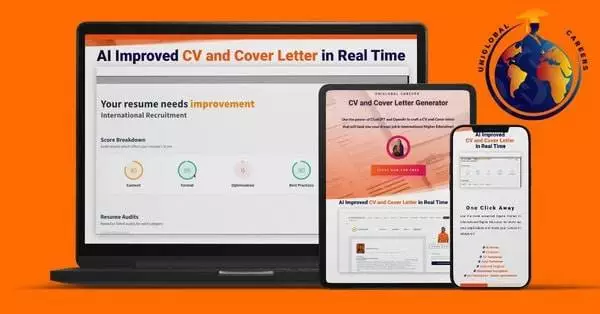As the world becomes increasingly interconnected, the global higher education job market has grown more competitive than ever before. In this article, we will explore the best strategies for job seekers looking to stand out and succeed in this challenging environment.
Understanding the Global Higher Education Job Market
Before beginning a job search, it is essential to understand the current state of the global higher education sector. Key players in this field include both public and private institutions, as well as government organizations and non-profit entities. However, as a result of recent trends and challenges, the job market can be highly competitive, with significant disparities in job opportunities and growth prospects.
One of the most significant trends in the higher education job market is the increasing importance of online education. With the rise of technology, many institutions are offering online courses and programs, which has created new job opportunities for educators and administrators. However, this trend has also created challenges for traditional brick-and-mortar institutions, which must adapt quickly to keep up with the competition.
Another trend in the higher education job market is the rise of interdisciplinary research. Many institutions are looking for candidates who can bring together different fields of study to solve complex problems. This trend has created new opportunities for researchers and educators who are skilled in multiple disciplines.
The continued globalization of academic institutions is also a significant trend in the higher education job market. Many institutions are looking for candidates who can bridge cultural differences and work effectively with diverse groups of people. This trend has created new opportunities for educators and administrators who have experience working in international settings.
Current challenges
Despite the opportunities created by these trends, there are also significant challenges in the higher education job market. One of the most significant challenges is the need to adapt quickly to rapidly evolving technologies. Educators and administrators must stay up-to-date with the latest tools and techniques to remain competitive in the job market.
Another challenge in the higher education job market is the rapidly shifting career paths. Many traditional jobs in higher education, such as tenured professorships, are becoming less common. This trend has created new opportunities for non-traditional career paths, such as working in edtech or educational consulting.
The ever-changing global political landscape is also a challenge in the higher education job market. Changes in immigration policies and political tensions can impact job opportunities for educators and administrators who work with international students or in international settings.
Job opportunities and growth prospects
Despite these challenges, there are still many exciting job opportunities available in the global higher education sector. Institutions are looking for candidates who can combine academic and practical experience to solve real-world problems. This trend has created new opportunities for educators and researchers who have experience working in industry or other non-academic settings.

Many institutions are also looking for candidates who have experience working with diverse groups of people. This trend has created new opportunities for educators and administrators who have experience working in international settings or with underrepresented populations.
Overall, the global higher education job market is diverse and dynamic. Educators and administrators who are adaptable, skilled, and experienced are well-positioned to succeed in this exciting field.
Building a Strong Academic Profile
To succeed in the global higher education job market, job seekers need to build a strong academic profile that reflects their skills, experience, and achievements. This can involve pursuing relevant degrees and certifications, gaining research experience and publications, developing teaching skills, and participating in conferences and networking events.

Pursuing relevant degrees and certifications
Many institutions are looking for candidates with specific educational qualifications and certifications, including advanced degrees in particular subjects or professional designations in specialized areas of study. Pursuing relevant degrees and certifications can provide job seekers with a competitive edge in the job market, as it demonstrates their commitment to their field and their willingness to invest in their education.
For example, a candidate seeking a position as a professor of biology may pursue a PhD in biology or a related field to demonstrate their expertise and knowledge in the subject matter. Alternatively, a candidate seeking a position in higher education administration may pursue a Master’s degree in education or a related field to gain the necessary skills and knowledge to excel in their role.
Gaining research experience and publications
Research experience and publications are key indicators of academic success and can be essential for landing desirable positions in the global higher education job market. Job seekers should focus on developing their research skills, publishing articles and papers in reputable academic journals or presenting at conferences, and collaborating with other researchers in their field.
For example, a candidate seeking a position as a research professor may focus on conducting original research and publishing their findings in reputable academic journals to establish themselves as an expert in their field. Alternatively, a candidate seeking a position as a teaching professor may focus on developing teaching materials and presenting at conferences to demonstrate their pedagogical skills and experience.
Developing teaching skills and experience
Teaching is a fundamental aspect of many academic positions, and institutions are looking for candidates who can demonstrate both pedagogical skill and experience in the classroom. Job seekers can gain these skills and experience by pursuing opportunities for teaching assistantships, leading workshops or seminars, or participating in educational training programs offered by their institution.

For example, a candidate seeking a position as a teaching professor may pursue opportunities to serve as a teaching assistant or lead workshops and seminars to gain experience in the classroom. They may also participate in educational training programs offered by their institution to develop their pedagogical skills and knowledge.
Participating in conferences and networking events
Networking is critical in the global higher education job market, and job seekers should take every opportunity to attend conferences, workshops, and other events in their field. By networking with other professionals in their area of expertise, job seekers can learn about job openings, establish professional contacts, and gain valuable insights into current trends and developments in their field.
For example, a candidate seeking a position as a professor of economics may attend conferences and workshops to learn about the latest research and developments in their field. They may also network with other professionals in their area of expertise to establish professional contacts and learn about job openings.
Overall, building a strong academic profile requires a combination of education, research experience, teaching skills, and networking. By pursuing these strategies, job seekers can position themselves for success in the global higher education job market and achieve their career goals.
Developing a Global Mindset
In today’s interconnected world, a global mindset is essential for success in the higher education job market. This involves embracing cultural diversity, learning new languages, adapting to different educational systems, and engaging in international collaborations.
Embracing cultural diversity
Embracing cultural diversity is not only important for success in the higher education job market, but it is also essential for personal growth and development. Understanding and respecting different cultures can broaden one’s perspective and lead to new insights and ideas. Job seekers should make a concerted effort to learn about different cultures, value systems, and workplace norms, and be sensitive to the needs and perspectives of others. They can do this by attending cultural events, participating in cultural exchange programs, or simply engaging in conversations with people from different backgrounds.
Learning new languages
Learning a new language is not only a valuable skill for the higher education job market, but it can also enhance one’s cognitive abilities and improve memory and problem-solving skills. Job seekers should consider pursuing language training courses or language immersion programs to develop these skills. In addition to traditional language classes, there are also many online resources and language exchange programs available. Learning a new language can also be a fun and rewarding experience, allowing job seekers to connect with new people and cultures.
Adapting to different educational systems
Adapting to different educational systems can be a challenging but rewarding experience. It requires flexibility, open-mindedness, and a willingness to learn. Job seekers should be aware of the educational structures and policies of their target institutions and be prepared to adapt quickly to new educational systems. This can involve learning new teaching methods, adjusting to different grading systems, and understanding the cultural expectations of students and faculty. Adapting to different educational systems can also provide job seekers with new perspectives on teaching and learning, and enhance their overall teaching skills.
Engaging in international collaborations
Engaging in international collaborations is an important aspect of many academic positions. It can lead to new research opportunities, collaborations, and funding. Institutions are looking for candidates who can demonstrate an ability to work effectively with colleagues from different parts of the world. Job seekers can highlight their experience in international collaborations by showcasing multinational research projects or international teaching assignments. They can also seek out opportunities to collaborate with colleagues from other countries, attend international conferences, or participate in international research networks.
In conclusion, developing a global mindset is essential for success in the higher education job market. Embracing cultural diversity, learning new languages, adapting to different educational systems, and engaging in international collaborations can not only enhance one’s career prospects but also broaden one’s perspective and lead to personal growth and development.
Leveraging Technology and Online Presence
The increasing importance of technology and online presence in the global higher education job market cannot be overstated. In today’s digital age, it is essential for job seekers to have a strong online presence and utilize technology to their advantage. Here are some tips on how to do just that:
Creating a professional online portfolio
A strong online presence is a critical component of any successful job search strategy. Job seekers should consider creating a professional website or online portfolio that showcases their academic qualifications, research interests, teaching experiences, and other relevant professional achievements. This can be an excellent way to promote themselves to potential employers and demonstrate their credentials and expertise.

When creating an online portfolio, job seekers should ensure that it is visually appealing and easy to navigate. This can be achieved by using a clean, modern design and organizing content into clear sections. It is also important to include a professional headshot and contact information so that potential employers can easily get in touch.
Utilizing social media for networking and job search
Social media offers many opportunities for networking and job search in the global higher education market. Job seekers should utilize platforms such as LinkedIn, Twitter, and Facebook to connect with colleagues, explore job openings, and keep up-to-date with industry news and developments.
When using social media for job search, it is important to maintain a professional image and avoid posting anything that could be seen as unprofessional or controversial. Job seekers should also engage with others in their field by sharing relevant articles and participating in online discussions.
Staying updated with industry news and developments
Staying informed about the latest news and developments in the global higher education sector is critical for job seekers looking to stand out in the competitive job market. Job seekers should regularly read industry publications and participate in webinars or online courses to maintain their knowledge of current trends and challenges in the field.
By staying up-to-date with industry news and developments, job seekers can demonstrate their commitment to their field and showcase their expertise to potential employers. This can be a valuable asset in a job interview or when networking with colleagues.
In conclusion, leveraging technology and online presence is essential for job seekers in the global higher education market. By creating a professional online portfolio, utilizing social media for networking and job search, and staying updated with industry news and developments, job seekers can increase their chances of success and stand out in a competitive job market.
Effective Job Search Strategies
Identifying target institutions and job openings, crafting a tailored CV and cover letter, preparing for interviews and presentations, and negotiating job offers and contracts are all critical components of an effective job search strategy.
Identifying target institutions and job openings
Job seekers should begin by identifying their target institutions and job openings that align with their academic qualifications, research interests, and professional goals. They can do this by exploring job postings on institutional websites or online job boards, conducting informational interviews with colleagues or recruiters, and networking with professionals in their field.
Crafting a tailored CV and cover letter
A tailored CV and cover letter are essential components of any job application. Job seekers should tailor their documents to the specific requirements of each job opening, highlighting their relevant skills, qualifications, and experience. They should also ensure that their CV and cover letter are formatted in a professional and visually appealing way.
Preparing for interviews and presentations
Preparing for job interviews and presentations is critical for successfully landing a job in the global higher education market. Job seekers should research the institution, anticipate interview questions, and practice their responses to potential questions. They should also ensure that their presentation materials are professionally designed, visually appealing, and support their message effectively.
Negotiating job offers and contracts
Negotiating job offers and contracts is a crucial step in the job search process. Job seekers should have a clear understanding of the compensation package, benefits, and work responsibilities, and be prepared to negotiate if necessary. This can involve discussing salary, vacation time, and work schedule, among other factors.
Building a Long-Term Career in Higher Education
Building a long-term career in higher education involves pursuing continuous professional development, establishing a strong network of contacts, balancing teaching, research, and service responsibilities, and planning for career advancement and leadership roles.
Pursuing continuous professional development
Continuous professional development is critical for success in the global higher education market. Job seekers should pursue opportunities for advanced training, attend professional development workshops or seminars, and participate in continuing education programs offered by their institutions.
Establishing a strong network of contacts
Networking is critical for establishing a long-term career in higher education. Job seekers should continue to expand their professional networks, participating in conferences, joining industry associations, and connecting with colleagues through social media or other online platforms.
Balancing teaching, research, and service responsibilities
Balancing teaching, research, and service responsibilities can be challenging in the higher education industry. Job seekers should develop a clear understanding of their institutional responsibilities and priorities and work to establish effective time management strategies to ensure that they can meet all of their obligations.
Planning for career advancement and leadership roles
Planning for career advancement and leadership roles is essential for building a long-term career in higher education. Job seekers should identify their long-term goals and work with their supervisors or mentors to create a clear plan for achieving these goals. This can involve pursuing advanced degrees or certifications, participating in research or administrative work, or developing new leadership skills.
In conclusion
Standing out in the global higher education job market can be challenging, but by embracing a global mindset, building a strong academic profile, leveraging technology and online presence, and pursuing effective job search strategies, job seekers can increase their chances of success. Moreover, by establishing a long-term career plan and pursuing continuous professional development, they can build a fulfilling and rewarding career in the global higher education industry.


